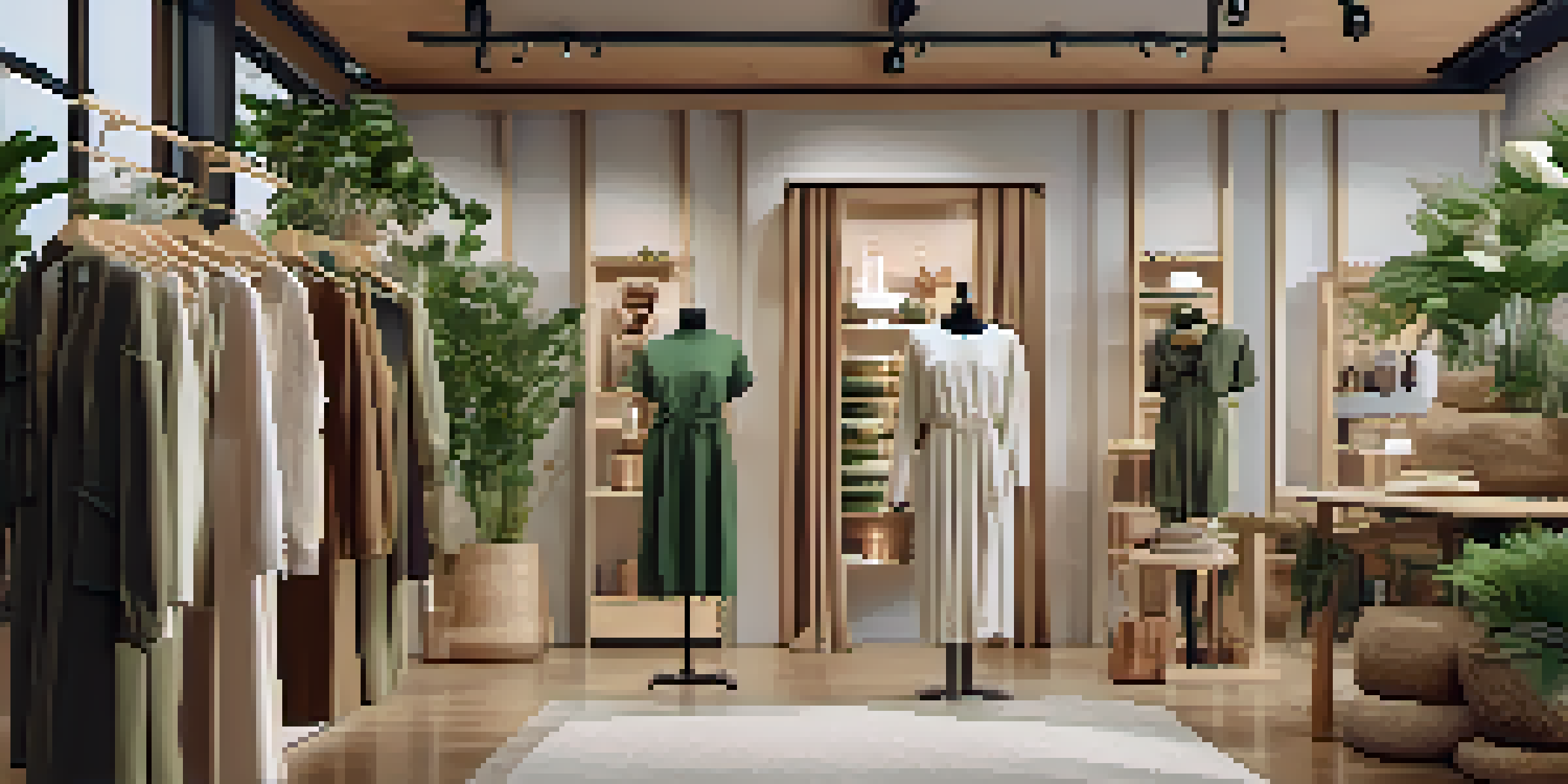The Effect of Economic Factors on Luxury Fashion Sustainability

Understanding Luxury Fashion and Sustainability
Luxury fashion is often seen as synonymous with exclusivity, quality, and prestige. However, as consumer awareness rises, sustainability has emerged as a critical factor in this sector. The challenge lies in balancing high-end appeal with eco-friendly practices, which can sometimes seem at odds with traditional luxury values.
Sustainability is no longer a choice, but a necessity for luxury brands to thrive in today's market.
Sustainability in luxury fashion refers to responsible sourcing, ethical production, and environmental stewardship. As brands begin to adopt sustainable practices, they must also educate their consumers on why these changes matter. This shift not only enhances brand loyalty but also aligns with the growing trend toward conscious consumerism.
Moreover, understanding the economic factors that influence sustainability can help brands navigate this complex landscape. From rising material costs to shifting consumer preferences, these elements play a crucial role in defining what luxury means in today's market.
The Role of Economic Factors in Luxury Fashion
Economic factors such as inflation, consumer spending power, and market trends heavily impact luxury fashion. When the economy is thriving, consumers are more likely to invest in high-end items that reflect their status. Conversely, during economic downturns, luxury brands must adapt their strategies to cater to a more budget-conscious audience.

For instance, during the COVID-19 pandemic, many luxury brands faced significant challenges as disposable income dwindled. This forced them to rethink their approaches to sustainability, often leading to more innovative and efficient production methods. Brands that embraced these changes were better positioned to weather the storm and maintain their relevance.
Sustainability Shapes Luxury Market
Luxury fashion brands are increasingly adopting sustainable practices to align with consumer demand for ethical and environmentally responsible products.
Additionally, economic growth in emerging markets has opened new avenues for luxury fashion brands. As more consumers in these regions enter the luxury market, brands must consider their sustainability practices to appeal to this conscious demographic.
Consumer Demand for Sustainable Luxury
Today's consumers are more informed and vocal about their purchasing choices, especially regarding sustainability. They are increasingly seeking brands that prioritize ethical practices and environmental responsibility. This demand is reshaping how luxury brands approach their product offerings and marketing strategies.
Luxury is not just about the product; it's about the story behind it, and sustainability is becoming a crucial part of that narrative.
For example, a study found that millennials and Gen Z consumers are willing to pay a premium for sustainable products. This trend has encouraged luxury brands to not only adopt sustainable practices but also to communicate these initiatives effectively. Transparency in sourcing and production is vital for building trust with the modern consumer.
Moreover, brands that successfully align luxury with sustainability can create a compelling narrative that resonates with their audience. This storytelling aspect can enhance brand loyalty and ultimately drive sales.
The Impact of Supply Chain on Sustainability
A luxury brand's supply chain is a vital aspect that can significantly affect sustainability efforts. The sourcing of raw materials, production processes, and distribution methods all contribute to the overall environmental impact of fashion. Brands must carefully evaluate each step of their supply chain to identify areas for improvement.
Sustainable sourcing, such as using organic materials or recycled fabrics, can minimize a brand's ecological footprint. Additionally, implementing ethical labor practices throughout the supply chain ensures that workers are treated fairly. This not only enhances a brand's reputation but also aligns with consumer values.
Economic Factors Influence Sustainability
Economic conditions, such as inflation and consumer spending power, significantly impact how luxury brands approach sustainability and production methods.
However, economic factors can complicate these efforts. For instance, the rising costs of sustainable materials may lead some brands to revert to cheaper, less eco-friendly options in times of economic strain. Balancing these financial pressures with a commitment to sustainability remains a key challenge.
Investment in Sustainable Practices
Investing in sustainable practices can initially seem daunting for luxury fashion brands, particularly when profit margins are tight. However, such investments can lead to long-term benefits, including reduced costs and enhanced brand loyalty. By adopting sustainable technologies and processes, brands can improve efficiency and reduce waste over time.
For example, some luxury brands are investing in innovative textile technologies that reduce water usage and energy consumption during production. These advancements not only promote sustainability but also appeal to environmentally conscious consumers.
Ultimately, the willingness to invest in sustainability can position luxury brands as leaders in the industry. This proactive approach can create a competitive advantage and foster a positive brand image.
Challenges in Balancing Luxury and Sustainability
Luxury fashion brands often face unique challenges when trying to balance exclusivity with sustainability. The perception that eco-friendly products are less luxurious can hinder sales, making it essential for brands to innovate in their offerings. Maintaining high-quality standards while integrating sustainable practices is a delicate balancing act.
Moreover, the luxury market is characterized by a fast-paced cycle of trends and consumer expectations. This can create pressure to produce new collections quickly, sometimes at the expense of sustainability. Brands must find ways to slow down this cycle and focus on timeless, quality pieces that promote sustainability.
Investing in Sustainable Innovation
Investing in sustainable technologies not only reduces waste but also positions luxury brands as leaders in a market shifting towards eco-conscious consumerism.
Ultimately, overcoming these challenges requires a shift in mindset. Luxury brands must embrace sustainability as an integral part of their identity rather than a temporary trend.
The Future of Luxury Fashion Sustainability
As the luxury fashion sector continues to evolve, sustainability will likely become a defining characteristic of successful brands. The ongoing dialogue surrounding climate change and ethical practices is driving a shift toward more responsible consumption. Consumers are increasingly demanding transparency and commitment from the brands they support.
Brands that proactively address sustainability are not only meeting consumer expectations but also paving the way for future growth. This evolution may lead to new business models that prioritize circularity, where products are designed for longevity and recyclability.

In conclusion, the future of luxury fashion sustainability hinges on the ability to adapt to economic factors while aligning with consumer values. Those who embrace this challenge will likely emerge as leaders in the new era of luxury.